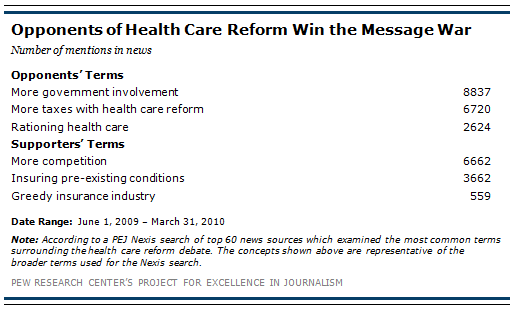
Then-House Opposition Leader Rep. John Boehner holds a press conference in 2009 mocking the length of the Affordable Care Act. <a href="http://www.flickr.com/photos/gopleader/4055448939/" target="_blank">Flickr/House GOP Leader</a>
The latest study from the Pew Project for Excellence in Journalism found that, despite the conservative perception that the mainstream media has a liberal slant, coverage of the Affordable Care Act was dominated by rhetoric used by the law’s opponents. According to Pew, “the concepts used by opponents were nearly twice as common as those used by supporters.”
The report comes with a chart illustrating the discrepancy:

The Pew study found that, as with most public policy issues, matters of “strategy” dominated, making up 41 percent of coverage of the Affordable Care Act. “Descriptions of plans” and the “state of health care” combined took up only 31 percent. Yet the substantive message of the law’s opponents clearly seeped through: Americans heard from the media that the law was bad.
Unsurprisingly, views on President Barack Obama’s signature domestic achievement have been mixed to negative. A recent poll conducted by the Associated Press and GFK Roper Public Affairs found that only 33 percent of respondents supported the law, while 47 percent opposed it. Nevertheless, 77 percent believed Congress should get to work on a new health care law immediately if the current one is struck down by the Supreme Court as unconstitutional. The consequences of a Supreme Court decision scrapping the law would be drastic for the people it is already helping—especially the quarter of Americans who continue to struggle with health care costs.
Pew describes the situation here as the White House having lost the “messaging war.” It’s also possible that most Americans don’t like the Affordable Care Act, and that more favorable coverage wouldn’t have convinced them otherwise. The phrase “messaging war,” however, seems like a deeply shallow way of saying that most Americans, who are neither health care wonks nor constitutional scholars, believed what they were hearing from the media. Journalists are supposed to separate truth from falsehood, but instead spent the bulk of their resources speculating about “politics and strategy.” This is the result.











